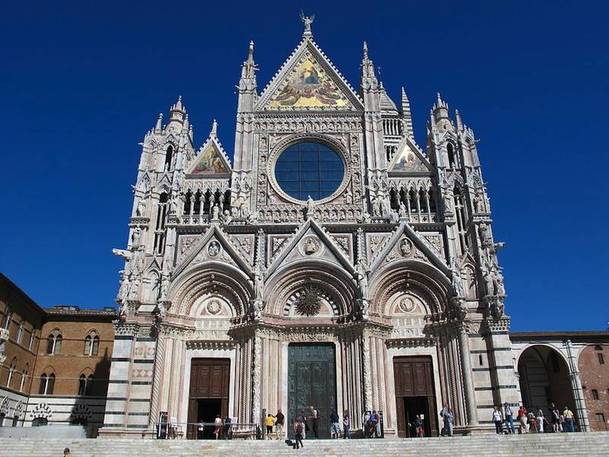


The Cathedral of Siena [2], more commonly known as the Siena Duomo, built between 1215 and 1263, is not only a Roman Catholic place of worship but it also houses a wealth of art works by famed artists Donatello [3] and Michelangelo [4]. The cathedral was designed and built by the father-son team of Nicola and Giovanni Pisano. One of the cathedral’s distinguishing features is its impressive Gothic [5] architecture. The Gothic style of architecture was popular from about 1000 to 1400. Some features unique to this type of architecture include rib vaults, flying buttresses and pointed Gothic arches. Another well-known cathedral built in this style is Notre Dame Cathedral in Paris.
Over one million visitors come each year to witness the beauty of the architecture and art the Siena Duomo has to offer. However, this structure does not just include the cathedral, but also a crypt, a baptistery, Piccolomini Library and a museum are a part of this massive complex.
Now with the re-opening of the “stairway to heaven”, these visitors will have a chance to enjoy an aerial view of the mosaics on the marble floor and to get a closer look at the cathedral’s hexagonal dome with “trompe l’oeil” coffers and Bernini’s gilded lamp.
The “trompe l’oeil” coffers are painted blue with gold stars. Along with Bernini’s gilded lamp in the center, this gives the dome the appearance of a golden sun.
One aspect of this cathedral’s design that makes it distinct is its striking black and white striped columns and walls, made from marble. However, these stripes are not simply decorative, they pay tribute to the colors of Siena’s coat of arms.
Some of the magnificent artwork located inside the Siena Duomo includes Donatello’s bronze relief sculpture “The Feast of Herod” created in approximately 1427. Also, near the library’s entrance is the Piccolomini altar appointed to Andrea Bregno around 1480. Michelangelo also worked on this altar, contributing his sculptures of Saint Peter, Saint Paul, Saint Gregory and Saint Pius.
This re-opening, however, will not be the first time staircases have been open to the public to enhance the experience of visiting the Duomo. In 2013, a series of staircases were opened to the public. This allowed visitors to climb up a walkway near the top of the 16-meter nave. With a view from above, visitors can fully appreciate the beauty of the cathedral located below them—the mosaics. Italian artist, Giorgio Vasari [6], described the mosaic-covered floor as “the most beautiful, largest and most magnificent floor that was ever made.” Each mosaic panel includes a beautifully detailed image that were created during a nearly 200 year period—1373 and 1547.
The “stairway to heaven” will reopen to the public beginning March 9 through October 31 for guided tours of the cathedral and attached Piccolomini Library [7].
Source URL: http://test.casaitaliananyu.org/magazine/focus/art-culture/article/siena-duomos-stairway-heaven-set-reopen-shortly
Links
[1] http://test.casaitaliananyu.org/files/duomosiena1425426824jpg
[2] http://www.operaduomo.siena.it/eng/index.htm
[3] http://www.metmuseum.org/toah/hd/dona/hd_dona.htm
[4] http://www.history.com/topics/michelangelo
[5] https://www.khanacademy.org/humanities/medieval-world/latin-western-europe/gothic1/a/gothic-architecture-an-introduction
[6] http://en.wikipedia.org/wiki/Giorgio_Vasari
[7] http://www.operaduomo.siena.it/eng/libreria.htm